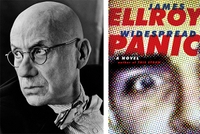Ellroy concludes the scorching trilogy begun with 1995's American Tabloid
with a crushing bravura performance. As ever, his sentences are gems of concision, and his characters—many of whom readers will remember from The Cold Six Thousand
and from American history classes—are a motley crew of grotesques often marked by an off-kilter sense of honor: stone bad-asses, in other words, though the women are stronger than the men who push the plot. The violence begins with an unsolved 1964 L.A. armored car heist that will come to have major repercussions later in the novel, as its effects ripple outward from a daring robbery into national and international affairs. There's Howard Hughes's takeover of Las Vegas, helped along by Wayne Tedrow Jr., who's working for the mob. The mob, meanwhile, is scouting casino locations in Central America and the Caribbean, and working to ensure Nixon defeats Humphrey in the 1968 election. Helping out is French-Corsican mercenary Mesplede, who first appeared in Tabloid
as the shooter on the grassy knoll and who now takes under his wing Donald Crutchfield, an L.A. peeping Tom/wheelman (based, curiously, on a real-life private eye). Mesplede and Crutchfield eventually set up shop in the Dominican Republic, where the mob begins casino construction and Mesplede and Crutchfield run heroin from Haiti to raise money for their rogue nocturnal assaults on Cuba. In the middle and playing all sides against one another is FBI agent Dwight Holly, who has a direct line to a rapidly deteriorating J. Edgar Hoover (“the old girl”) and a tormented relationship with left-wing radical Karen Sitakis, and, later, Joan Klein, whose machinations bring the massive plot together and lead to more than one death. Though the book isn't without its faults (Crutchfield discovers a significant plot element because “something told him to get out and look”; Wayne's late-book transformation is too rushed), it's impossible not to read it with a sense of awe. The violence is as frequent as it is extreme, the treachery is tremendous, and the blending of cold ambition and colder political maneuvering is brazen, all of it filtered through diamond-cut prose. It's a stunning and crazy book that could only have been written by the premier lunatic of American letters. (Sept.)


